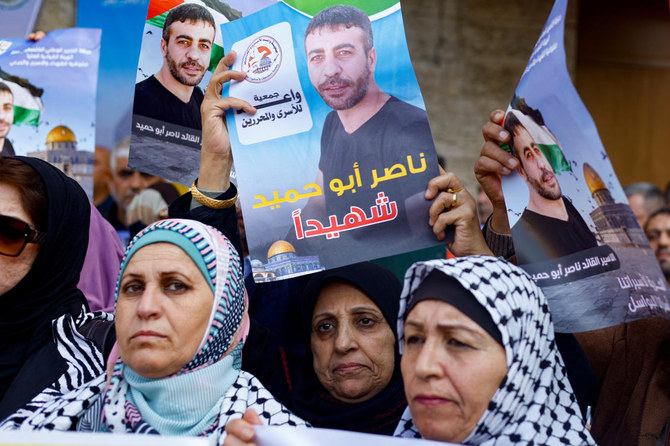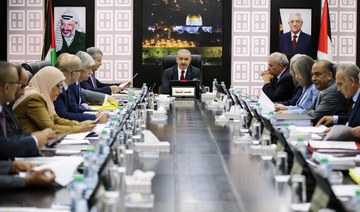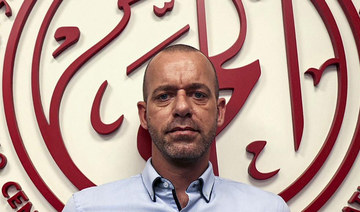RAMALLAH: Hundreds of Palestinians took to the streets and stores shuttered across the occupied West Bank on Tuesday to protest the death of a veteran prisoner in Israeli captivity.
Violent confrontations with the Israeli army took place in West Bank cities, including Ramallah, Hebron, Bethlehem, Nablus, Qalqilya and Nablus, and the Gaza Strip.
Mourners gathered for public vigils after schools suspended classes and students returned home.
The protests follow the death of veteran Palestinian prisoner Nasser Abu Humaid in an Israeli hospital.
FASTFACT
Shawan Jabarin, director of the Al-Haq rights group, told Arab News that Abu Humaid should have been released to be with his family during his final days.
Abu Humaid, 50, a cancer patient, died on Tuesday, two days after being moved from Ramle clinic prison, where he was being held, to the Israeli Assaf Harofeh hospital.
Palestinians consider him a patriotic leader who sacrificed his life for his cause, and accuse Israeli authorities of “medical negligence” during his years of detention.
The Palestinian Prisoners Club announced Abu Humaid’s death at dawn on Tuesday and said that the Israeli prison administration’s policy of “slow killing” had caused him to develop lung cancer.
President Mahmoud Abbas said that the Israeli occupation responsible for the death of Abu Humaid because of the policy of deliberate medical negligence pursued by the Israeli prison administration against prisoners.
Protesters demanded that Israel be held accountable for its crimes against the prisoners.
Demonstrators raised photographs of Abu Humaid and his elderly mother, and called for his body to be handed over and buried in a manner befitting a national leader.
The Palestinian Authority officially asked Israel to return Abu Humaid’s body.
Families of Israelis killed by Palestinian attacks, however, demanded that Defense Minister Benny Gantz refuse to repatriate the body.
Abu Humaid’s family said on Tuesday that it will remain in a state of mourning “until his body is liberated, along with all the bodies of the martyrs.”
The family said that it will not receive mourners before the body’s release and burial.
Abu Humaid’s death brings the number of Palestinian prisoners who have died in Israeli prisons to 233 since 1967, with 74 said to have been victims of medical negligence.
Israeli jails today hold about 4,700 prisoners, including about 150 children, 33 women and 600 inmates in poor health. These include 24 who suffer from cancer and tumors of varying severity.
Prisoners held by Israel have declared three days of mourning with the return of meals.
Israeli doctors confirmed in early September that Abu Humaid was close to death, but Israeli authorities refused to release him.
Abu Humaid also rejected a proposal by his lawyer to request a “pardon” from Israel that would have led to his release.
Shawan Jabarin, director of the Palestinian Al-Haq organization for Human Rights, told Arab News that humanitarian standards dictated that Abu Humaid should have been released to be with his family during his final days.
Israelis “chose to take revenge on Abu Humaid as they saw him slowly dying daily,” said Jabarin.
Abu Humaid, who spent more than 30 years in Israeli prisons, was arrested for the last time during the second intifada in 2022 and sentenced to life imprisonment.
Four of his brothers are also serving life sentences, while another was killed by the Israeli army, which also demolished his family house five times.
Abu Humaid wrote a farewell message to the Palestinian people a week ago.
“I am going to the end of the road reassured and confident that I am leaving behind me a great people who will not forget their cause and the issue of the prisoners,” he said.
“I am not sad about this end, and I bid farewell to a great heroic people to join the convoy of the martyrs of Palestine.”
Social media networking sites were filled with images of Abu Humaid and his farewell message.
The Higher Presidential Committee for the Follow-up of Church Affairs in Palestine announced the postponement of the Christmas caravan event in the Ramallah and Al-Bireh governorate after his death.
Abdul-Meniem Wahdan, assistant vice president of the Fatah movement in Palestine, told Arab News that the organization is concerned about the fate of Palestinian prisoners with health problems, especially those with cancer, after Abu Humaid’s death.
Wahdan accused Israeli authorities of delaying treatment to sick prisoners and refusing families’ requests to bring in private doctors to review prisoners’ health status.
He said that the Israeli authorities have also hindered attempts by the International Committee of the Red Cross to follow up on the condition of Palestinian prisoners.
“In all countries, the ICRC is respected, except in Israel, where its role is marginalized because Israel considers itself a state above the law. But it is an immoral state,” Wahdan told Arab News.
He described his friend Abu Humaid as “an ideological fighter who believed in the two-state solution, a contemporary of all generations of the Palestinian struggle, gentle manners, full of positive energy and courageous stances.”




























